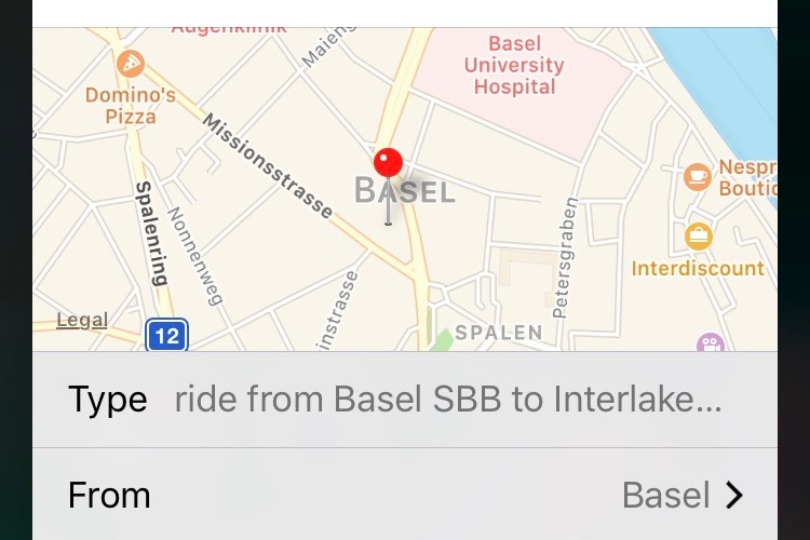There are currently two main types of conversational interfaces: the voice assistants, which you talk to, for example Apple's Siri, and the chatbots, which you type to, for example Facebook's M/Chatbot. For various reasons, all major tech companies have recognized the potential of voice recognition, chatbots and artificial intelligence. Apple has Siri, Mircosoft has Cortana, Facebook has M, Amazon has Echo/Alexa, Google has "Ok Google" and Samsung just recently acquired Viv.
We have developed a mobile routing app prototype, integrated with Apple’s Siri, which allows users to find train connections easily by saying for example, “Hey Siri, when is the next train to Zürich?” Processing such a simple question has many challenges. First of all natural language processing needs to be applied in order to understand what the user has said. Depending on what language the user is using, Siri sometimes understands the destination/location “Zürich” correctly and sometimes it understands it as “Missouri”. Once Siri has transcribed the sentence correctly, Siri needs to understand the meaning of the sentence. In this case, that the user wants to take a train in order to travel to Zürich and that the user is asking for a timetable. Apple’s SiriKit currently does not support such a “timetable” domain, but it supports the so called “Ride booking” domain. We have contacted Apple in order to introduce a “timetable” domain for public transportation. For the moment, however we continued our prototype by using the “Ride booking” domain. This means that we have to rephrase our timetable question as follows, “Hey Siri, book me a ride to Zürich”. Because of the words “book” and “ride” Siri is able to map this request to the “Ride booking” domain, which requires various input parameters, such as “Pickup location” and “Drop-off location”. Because in our sentence we did not specify the pickup location, we will assume the current geolocation of the user as pickup location. We also didn’t say what mobile app to use in order to actually book the ride. Therefore Siri will ask what app we want to use, or we can help Siri by saying “Hey Siri, book me a ride to Zürich with TrainApp”. As soon as Siri has gathered all domain specific information from the user, Siri will forward the information as parameters to our mobile app. This finally allows us to check when the next train will depart to Zürich. There are many more challenges as you can imagine, but it hopefully gives you an idea of the complexity of the seemingly simple question “When is the next train to Zürich?”.
Integrating conversational interfaces is fascinating and challenging and we are excited to be part of this development. Conversational interfaces might not work perfectly yet, but just as a child takes many years to learn to walk and speak, we will learn how to develop and use conversational interfaces over the coming years.
As an experienced integrator, we are taking a lead in developing conversational interface based solutions, integrating third-party voice assistants with new and existing clients and backend applications. We are developing mobile apps and backend applications using conversational interfaces for various industries, such as public transportation, payment and retail. A very important topic regarding conversational conversations is privacy. We take privacy very seriously and therefore provide solutions, where conversations between humans and computers/phones are kept within premises.

